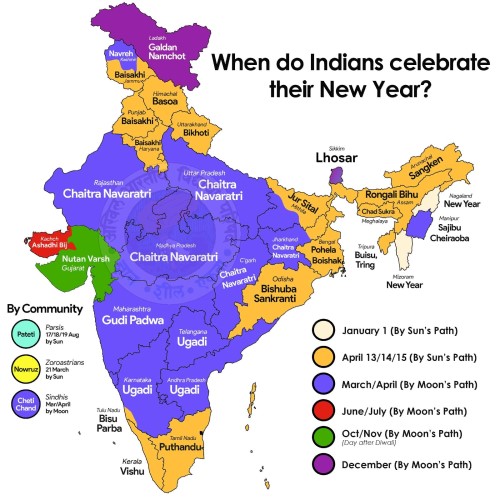Bharat, known for its vibrant cultural tapestry, presents a mesmerizing array of New Year celebrations. Diverse communities across the length and breadth of the country mark the beginning of a new year with fervor, each with its unique customs, traditions, and names. From Bihu in Assam to Baisakhi in Punjab, Gudi Padwa in Maharashtra to Cheti Chand in Sindh, and numerous others, these celebrations reflect India's rich heritage and unity in diversity.

Bihu in Assam:
Bihu, one of Assam's most significant festivals, marks the Assamese New Year. It is celebrated with immense joy and enthusiasm by the Assamese community. The festival spans over several days, with each day holding special significance. Rongali Bihu, also known as Bohag Bihu, is the most popular among the three Bihu festivals and is celebrated in mid-April. It symbolizes the arrival of spring and the onset of the Assamese New Year.
Baisakhi in Punjab:
Baisakhi, celebrated predominantly by the Sikh community, holds great religious and cultural significance. It marks the Sikh New Year and commemorates the formation of the Khalsa Panth by Guru Gobind Singh in 1699. The festival falls on the 13th or 14th of April and is celebrated with vibrant processions, traditional folk dances like Bhangra and Gidda, and prayers at Gurudwaras.
Gudi Padwa in Maharashtra:
Gudi Padwa heralds the New Year for the Maharashtrian community and falls on the first day of the Chaitra month according to the Hindu calendar. It symbolizes the victory of good over evil and is celebrated with the hoisting of Gudi (a decorated bamboo pole with a cloth and a garlanded goblet atop it), traditional rituals, and feasting on Maharashtrian delicacies.
Cheti Chand in Sindh:
Cheti Chand, celebrated by the Sindhi community, marks the birth anniversary of the patron saint of Sindhis, Jhulelal. It usually falls in late March or early April and signifies renewal and hope. The festival is marked by prayers, processions carrying an image of Jhulelal, distribution of sweets, and communal feasting.
Ugadi:
Ugadi in Andhra Pradesh, Telangana, and Karnataka: Ugadi, also known as Yugadi, marks the Telugu and Kannada New Year. It falls on the first day of the Chaitra month and is celebrated with traditional rituals, Panchanga Sravanam (reading of the almanac), and feasting.
Vishu in Kerala:
Vishu heralds the Malayalam New Year in Kerala and falls in mid-April. It is celebrated with the Vishukkani, an arrangement of auspicious items displayed the night before Vishu, followed by Vishu Sadya (traditional feast) and cultural performances.
Pohela Boishakh in West Bengal:
Pohela Boishakh, also known as Bengali New Year, is celebrated in mid-April with colorful processions, traditional music, dance, and feasting. The day is marked by wearing new clothes, visiting temples, and exchanging sweets.
Bharat's diverse cultural landscape is beautifully exemplified by the multitude of New Year celebrations observed across its various communities. These celebrations, steeped in tradition and symbolism, not only mark the passage of time but also reinforce the unity amidst diversity that defines the Indian ethos. As people come together to celebrate these festivities, they not only honor their heritage but also embrace the richness of India's cultural mosaic.
Very well written!
Martin Luther King Day 2025
2025 Calendar Wallpapers
Month Wise 2025 Calendar
Floral 2025 Calendar